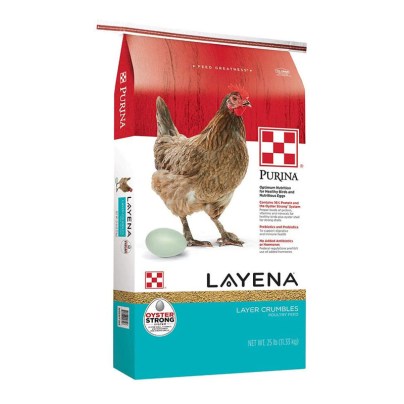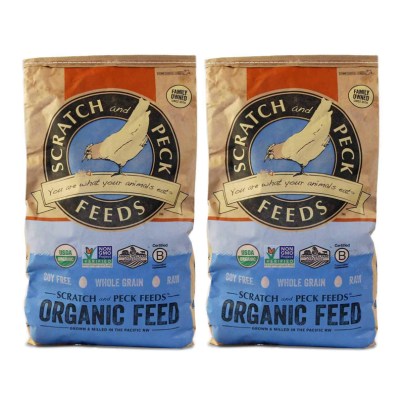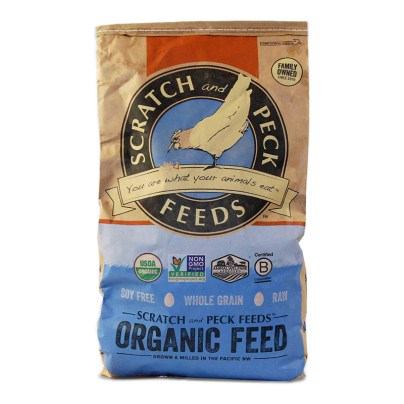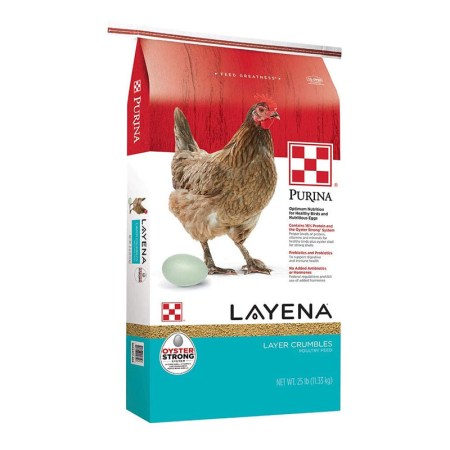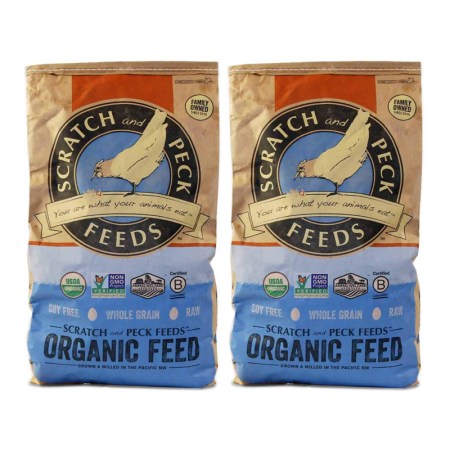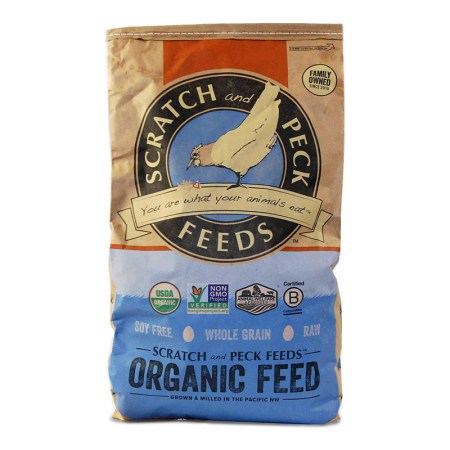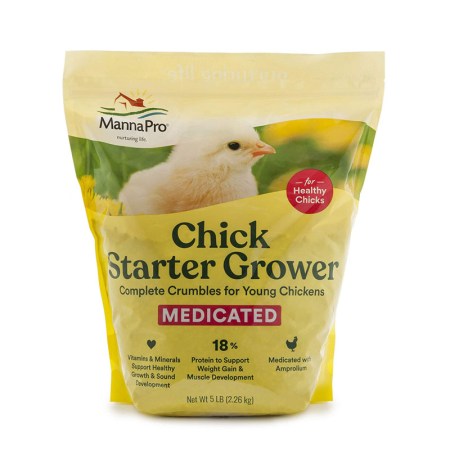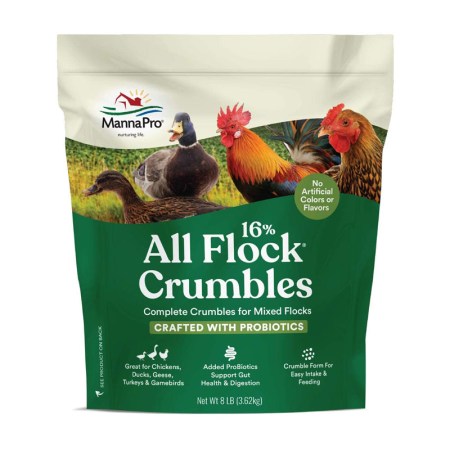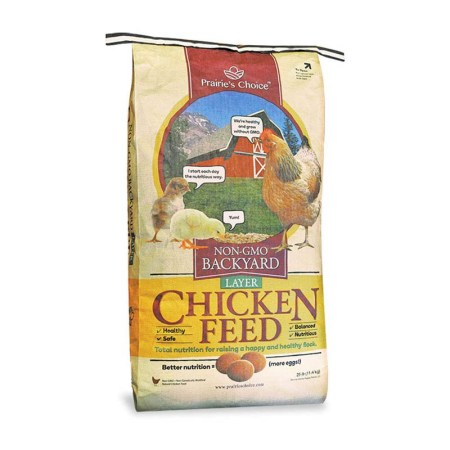We may earn revenue from the products available on this page and participate in affiliate programs. Learn More ›
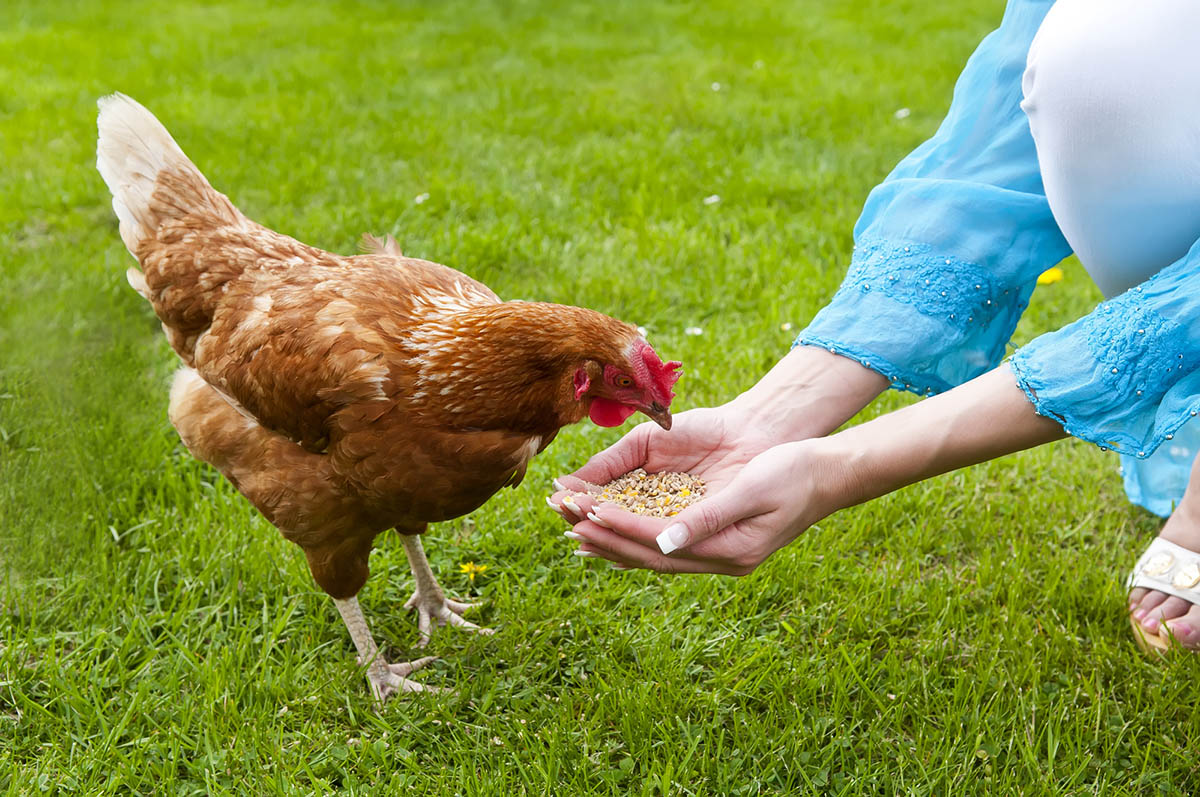
Raising backyard chickens is becoming increasingly popular, and it’s easy to see why when you eat your first homegrown egg. However, raising backyard chickens is also an immense responsibility that requires quite a bit of education. In particular, knowing what to feed your chickens can feel intimidating since receiving the correct nutrients for each stage of their life is essential to their overall health and growth. With so many available options, making a decision on the best chicken feed can be overwhelming.
To help you wade through the possibilities, this guide will walk you through the important considerations to keep in mind as you shop, share tips for buying and using chicken feed, and explore some of the best chicken feed in a variety of categories to assist you in finding the product that suits the chickens on your homestead.
- BEST OVERALL: Purina Layena | Nutritionally Complete Layer Hen Feed
- BEST BANG FOR THE BUCK: Scratch and Peck Feeds Naturally Free Organic Layer
- BEST ORGANIC: Scratch and Peck Feeds Organic Layer Feed with Corn
- BEST FOR SMALL CHICKS: Manna Pro Chick Starter | Medicated Chick feed
- BEST UNIVERSAL: Manna Pro All Flock with Probiotics Crumble
- BEST LAYER: Prairie’s Choice Non-GMO Backyard Chicken Feed
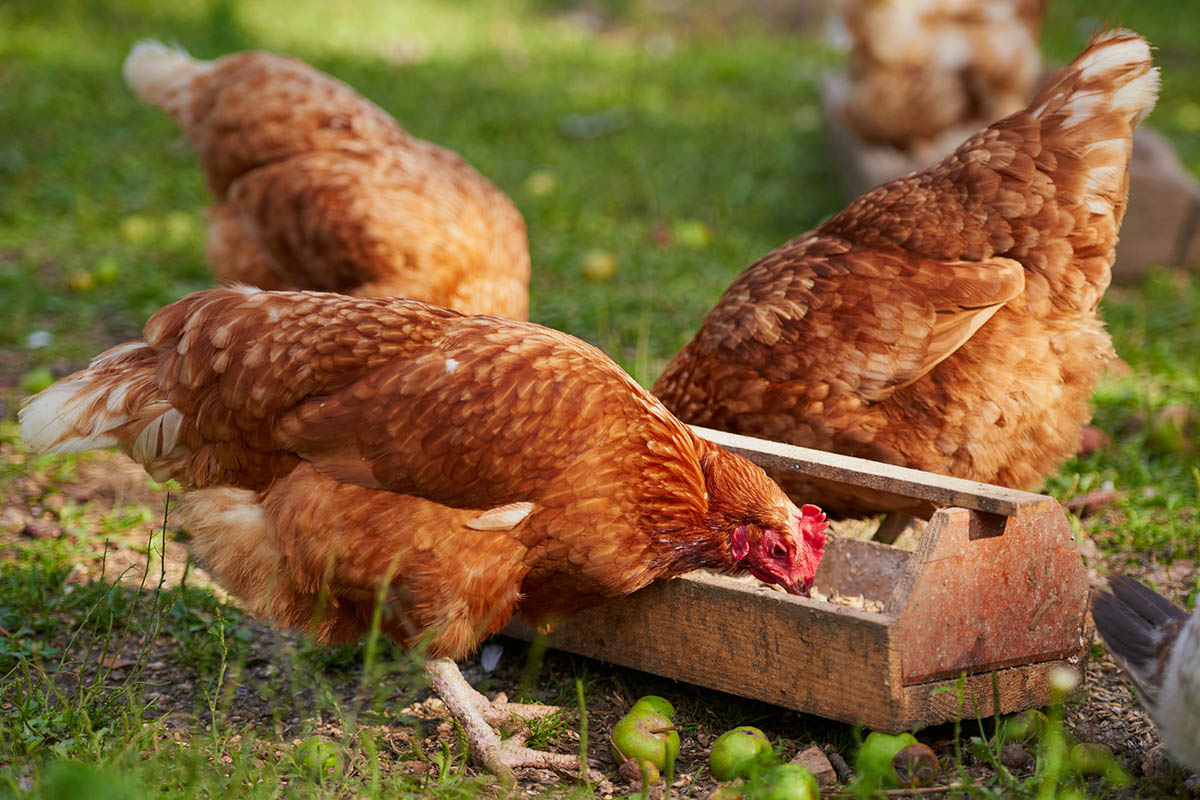
What to Consider When Choosing The Best Chicken Feed
The following considerations—the type of feed, the purpose of your chickens, and the age of your chickens—will begin to equip you with the knowledge to make an educated decision as you shop for the best chicken feed for your unique backyard brood.
Feed Types
While the vitamins and minerals within chicken feed are an essential piece of the puzzle, another key factor to consider is the shape of the feed. There are three types of feed, and they each have a different shape: crumble, pellet, and scratch. Each type of chicken feed serves a unique purpose.
Crumble is the most popular type of chicken feed. As the name suggests, its shape is similar to crumbles of bread or grain. This feed type is best suited for young chicks because it is easier for them to eat. It’s also ideal for multispecies flocks because both smaller and larger birds can easily eat it.
Pellet is a bit less common type of chicken feed than crumble. It is the preferred feed for adult chickens who can break up and digest the more rigid and larger-size pellets.
Scratch is the most unique type of chicken feed because it is not a uniform food. This type of chicken feed includes crumble, pellets, whole grains, corn, seeds, and other ingredients at which the chickens can scratch and pick. Scratch is typically organic and can be fermented to add extra probiotics that are important to chickens’ overall health.
Age of Chickens
As with puppies and kittens, the age of your chickens helps determine which feed is best for their development. Newly hatched chicks will need a starter feed, also known as grower feed, to provide them with the proper nutrients they need to grow. Starter feed is also smaller and typically in crumble form, which is safer and easier for chicks to eat than pellets or scratch.
Young chickens that are not quite of egg-laying age can graduate from grower feed to eating a generic adult chicken feed. There are no unique feed ingredients required for this age of chicken; crumble, pellets, and scratch are all acceptable options. Be sure to provide them with enough vitamins and minerals to continue their healthy growth, and you’ll be good to go.
Adult chickens that are laying eggs, or will be soon, need a particular type of feed called layer feed. This feed is available in crumble, pellet, and scratch form but is specifically formulated to provide egg-laying chickens with essential nutrients like calcium and amino acids for successful egg production. If you’re wondering how to ensure your chickens lay an abundance of eggs, you can also give them plenty of rich foods and extra treats, such as table scraps. Healthy and well-fed chickens equal more eggs.
Purpose of Chickens
Your purpose for raising chickens will also affect what kind of feed you should buy. If you are raising chickens to be egg layers, you’ll want to find a high-quality layer feed. As mentioned above, these feeds are available in many forms, but they all serve the same function: to provide chickens with plenty of nutrients to produce plenty of strong-shelled eggs.
However, if you’re raising chickens for meat, consider a more protein-rich feed to encourage them to grow more quickly and gain weight. While you won’t want to overdo it, providing your chickens with grower feed further into their adult lives can increase the amount of weight they gain in a shorter period of time.
For both purposes, feeding organic food to your chickens may be an essential consideration to keep in mind. If you provide your family with organic fruits and vegetables, you might want to consider using organic feed for your chickens as well. Otherwise, the eggs and meat that come from them won’t be organic.
Tips for Buying and Using the Best Chicken Feed
There’s more to feeding and raising healthy and growing chickens than just providing them with the right feed. Chickens need other supplements, such as oyster shells, to aid egg production and assist with digestion. Birds do not have teeth and instead use an organ called a gizzard to grind up their food. To do this effectively, they need the grit that comes from oyster shells to help them mash up the food. There are actual products called grit, which is large sand, to enhance that process, or you can use oyster shells, which have the added benefit of providing chickens with extra calcium. Calcium is an important nutrient for strong-shelled eggs. Without enough of it, your chickens could lay eggs that are soft and inedible.
Here are several other tips to keep in mind for feeding chickens to ensure optimal health and growth.
- Add table scraps to chicken feed to increase the nutrient level and reduce food waste.
- Provide plenty of fresh, clean water to ensure they can effectively grind up and swallow chicken feed.
- Don’t leave chicken feed out overnight as it encourages pests and predators to come into your yard and potentially harm your chickens.
- Never add food to chicken feed that you think could be moldy or spoiled.
Our Top Picks
Equipped with the knowledge you’ve gained from this guide thus far, you can now begin your search for the best chicken feed for your homestead. Remember to look for age-appropriate foods, take note of the type of feed, and consider the purpose of your chickens. Especially if you have egg-laying chickens, be sure to find an option with plenty of calcium and amino acids. Read on to discover some of the best chicken feeds on the market in a variety of categories to meet the needs of your chickens.
Best Overall
Purina Layena | Nutritionally Complete Layer Hen Feed
See ItThis 25-pound bag of chicken feed by Purina is specifically formulated for egg-laying chickens and is high in essential nutrients, such as calcium, for good egg production. It also includes oyster shells to improve eggshell strength and aid in a healthy digestive process. The feed is in crumble form, making it easier for both younger and older chickens to eat it.
Other essential ingredients in this chicken feed include vitamins A, D, and E to improve overall health along with amino acids for the promotion of thick feathering and healthy eggs. Prebiotics, probiotics, and yeast are also added to support digestive and immunity health. Purina has also included a high level of xanthophyll derived from marigolds to produce a deep-yellow egg yolk.
Best Bang for the Buck
Scratch and Peck Feeds Naturally Free Organic Layer
See ItWith this organic chicken feed, you can save when you purchase two 25-pound bags instead of buying them individually, which is ideal if you are feeding a lot of chickens. Scratch and Peck Feeds chicken feed is both USDA-certified and non-GMO Project Verified. These credentials are the result of meticulous care and consideration in crafting a healthy and ethical chicken feed.
Being a scratch feed, it offers large chunks of corn, seeds, and other grains. Because of this thicker consistency, it is important not to give this feed to chickens under 20 weeks old. For older chickens, be sure to provide grit and fresh water to assist them in ingesting and digesting this hearty organic feed.
In addition to being soy-free and whole grain, this feed is a fantastic option for fermentation. Fermented foods are an excellent addition to a chicken’s diet as they improve both their gut health and their overall health. This feed boasts 16 percent protein to contribute to healthy weight gain and muscle growth.
Best Organic
Scratch and Peck Feeds Organic Layer Feed with Corn
See ItScratch and Peck Feeds crafts a raw, soy-free, and whole-grain chicken feed that you can feel good about giving to your chickens. This organic feed is both USDA-certified and non-GMO Project Verified. With these certifications, you can rest easy knowing your birds won’t be eating any harmful chemicals or harsh preservatives and passing them on to you in their meat or eggs.
This scratch chicken feed is an excellent source of carbohydrates and also provides 16 percent protein. Additionally, because the feed is a whole grain and not in pellet form, it is ideal for fermenting. Fermented foods are an excellent addition to a healthy diet for chickens of all ages. However, because this feed has larger pieces of corn and other seeds, it is not suitable for chickens under 20 weeks old. Purchase options include a 25-pound bag, a two-pack of 25-pound bags, and a 40-pound bag.
Best for Small Chicks
Manna Pro Chick Starter | Medicated Chick feed
See ItGiving chicks a strong start in life is essential to their health and growth as they mature into adult chickens. This 5-pound bag of chick starter by Manna Pro is an excellent source of vitamins and minerals that chicks need to grow healthy and strong. The 18 percent protein content in this feed will support healthy weight gain and muscle development. To allow chicks to more comfortably eat this feed, it is crafted in crumble form, but you should still plan to supplement it with fine grit and fresh water. Chicks can easily choke on relatively dry foods like feed and will need fresh water and grit to eat it safely.
This chicken feed has the added benefit of being medicated. Medicated feed is vital for small chicks to help them fight off diseases like coccidiosis that they can contract from the ground. Chicks kept in a brooder or coop might be safe without such medicated feed. However, if they come in contact with dirt or other older chickens that go outside, it’s safer to provide them with medicated feed.
Best Universal
Manna Pro All Flock with Probiotics Crumble
See ItSometimes chickens are not the only feathery friends we host on our homesteads. If your flock includes other birds, like ducks, geese, and even turkeys, it’s most convenient to use a safe feed that all these different types of birds can eat. Manna Pro has you covered with this 8-pound bag of “all flock” crumble feed with 16 percent protein that is ideal for waterfowl. It offers added probiotics to support healthy digestion and overall gut health while remaining free of any artificial colors and flavors.
This universal feed provides your birds with a well-rounded variety of vitamins and minerals to support optimal health. While you may still want to provide your chicks with a starter feed, this feed is an acceptable option for birds in all stages of life. Be sure to provide oyster shells or grit along with fresh water to help with ingestion and digestion.
Best Layer
Prairie's Choice Non-GMO Backyard Chicken Feed
See ItPrairie’s Choice has crafted a feed formulated specifically for egg-laying chickens. It’s higher in nutrients such as calcium to ensure strong eggshells and amino acids to encourage higher egg production.
This crumble feed is non-GMO, non-medicated, gluten-free, antibiotic-free, and provides 16 percent protein. You can be confident your chickens aren’t ingesting any harmful chemicals when they eat this feed. To help your chickens reach optimal health and strength and prepare their bodies to begin laying eggs, you can provide them with this feed for a few months before you actually expect them to start laying eggs. This American-grown and packaged chicken feed is available in a 25-pound bag.
FAQs About Chicken Feed
Learning as much as you can about some of the best chicken feeds available today is an excellent start to ensuring you raise healthy, strong, and—if they are egg-laying—productive chickens. However, you might have gathered some questions along the way. Check out some of the most frequently asked questions and their answers below.
Q: What are the most important ingredients to look for in a chicken feed?
Look for ingredients like calcium and amino acids for egg-laying chickens and prebiotics and probiotics to promote a healthy gut and overall digestive health.
Q: Should chickens be fed only chicken feed?
While chickens can survive on only chicken feed, it’s recommended to supplement their diet with table scraps or free-ranging them on a pasture to balance out their diet.
Q: What are the nutritional requirements for chickens?
Chickens need a balanced diet of carbohydrates, fats, proteins, vitamins, and minerals. One of the most important percentages to track is protein. Chicks must have a feed that contains about 24 percent protein, maturing chickens need about 20 percent protein, adult chickens require about 18 percent protein, and egg-laying chickens should receive feed that includes at least 16 percent protein.
